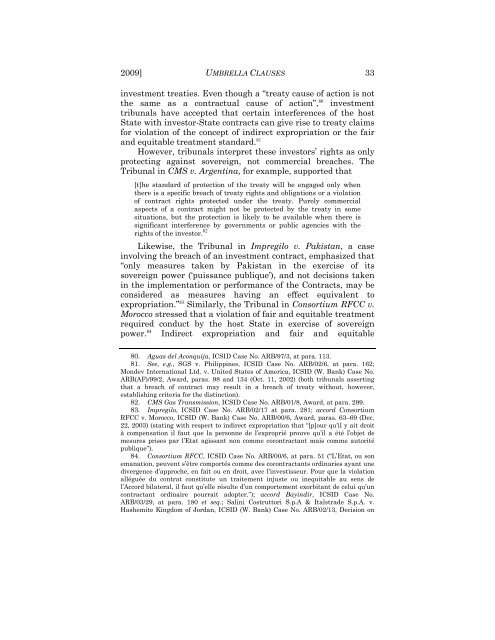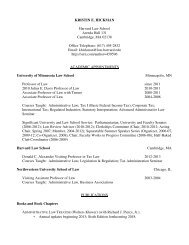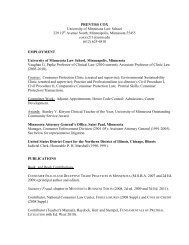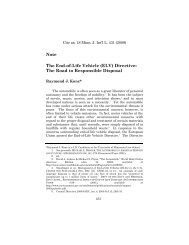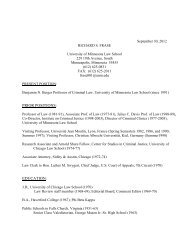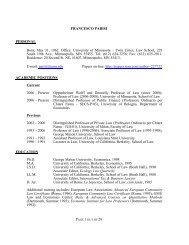Enabling Private Ordering - the University of Minnesota Law School
Enabling Private Ordering - the University of Minnesota Law School
Enabling Private Ordering - the University of Minnesota Law School
You also want an ePaper? Increase the reach of your titles
YUMPU automatically turns print PDFs into web optimized ePapers that Google loves.
2009] UMBRELLA CLAUSES 33<br />
investment treaties. Even though a “treaty cause <strong>of</strong> action is not<br />
<strong>the</strong> same as a contractual cause <strong>of</strong> action”, 80 investment<br />
tribunals have accepted that certain interferences <strong>of</strong> <strong>the</strong> host<br />
State with investor-State contracts can give rise to treaty claims<br />
for violation <strong>of</strong> <strong>the</strong> concept <strong>of</strong> indirect expropriation or <strong>the</strong> fair<br />
and equitable treatment standard. 81<br />
However, tribunals interpret <strong>the</strong>se investors’ rights as only<br />
protecting against sovereign, not commercial breaches. The<br />
Tribunal in CMS v. Argentina, for example, supported that<br />
[t]he standard <strong>of</strong> protection <strong>of</strong> <strong>the</strong> treaty will be engaged only when<br />
<strong>the</strong>re is a specific breach <strong>of</strong> treaty rights and obligations or a violation<br />
<strong>of</strong> contract rights protected under <strong>the</strong> treaty. Purely commercial<br />
aspects <strong>of</strong> a contract might not be protected by <strong>the</strong> treaty in some<br />
situations, but <strong>the</strong> protection is likely to be available when <strong>the</strong>re is<br />
significant interference by governments or public agencies with <strong>the</strong><br />
rights <strong>of</strong> <strong>the</strong> investor. 82<br />
Likewise, <strong>the</strong> Tribunal in Impregilo v. Pakistan, a case<br />
involving <strong>the</strong> breach <strong>of</strong> an investment contract, emphasized that<br />
“only measures taken by Pakistan in <strong>the</strong> exercise <strong>of</strong> its<br />
sovereign power (‘puissance publique’), and not decisions taken<br />
in <strong>the</strong> implementation or performance <strong>of</strong> <strong>the</strong> Contracts, may be<br />
considered as measures having an effect equivalent to<br />
expropriation.” 83 Similarly, <strong>the</strong> Tribunal in Consortium RFCC v.<br />
Morocco stressed that a violation <strong>of</strong> fair and equitable treatment<br />
required conduct by <strong>the</strong> host State in exercise <strong>of</strong> sovereign<br />
power. 84 Indirect expropriation and fair and equitable<br />
80. Aguas del Aconquija, ICSID Case No. ARB/97/3, at para. 113.<br />
81. See, e.g., SGS v. Philippines, ICSID Case No. ARB/02/6, at para. 162;<br />
Mondev International Ltd. v. United States <strong>of</strong> America, ICSID (W. Bank) Case No.<br />
ARB(AF)/99/2, Award, paras. 98 and 134 (Oct. 11, 2002) (both tribunals asserting<br />
that a breach <strong>of</strong> contract may result in a breach <strong>of</strong> treaty without, however,<br />
establishing criteria for <strong>the</strong> distinction).<br />
82. CMS Gas Transmission, ICSID Case No. ARB/01/8, Award, at para. 299.<br />
83. Impregilo, ICSID Case No. ARB/02/17 at para. 281; accord Consortium<br />
RFCC v. Morocco, ICSID (W. Bank) Case No. ARB/00/6, Award, paras. 63–69 (Dec.<br />
22, 2003) (stating with respect to indirect expropriation that “[p]our qu’il y ait droit<br />
à compensation il faut que la personne de l’exproprié prouve qu’il a été l’objet de<br />
mesures prises par l’Etat agissant non comme cocontractant mais comme autorité<br />
publique”).<br />
84. Consortium RFCC, ICSID Case No. ARB/00/6, at para. 51 (“L’Etat, ou son<br />
emanation, peuvent s’être comportés comme des cocontractants ordinaries ayant une<br />
divergence d’approche, en fait ou en droit, avec l’investisseur. Pour que la violation<br />
alléguée du contrat constitute un traitement injuste ou inequitable au sens de<br />
l’Accord bilateral, il faut qu’elle résulte d’un comportement exorbitant de celui qu’un<br />
contractant ordinaire pourrait adopter.”); accord Bayindir, ICSID Case No.<br />
ARB/03/29, at para. 180 et seq.; Salini Costruttori S.p.A & Italstrade S.p.A. v.<br />
Hashemite Kingdom <strong>of</strong> Jordan, ICSID (W. Bank) Case No. ARB/02/13, Decision on


